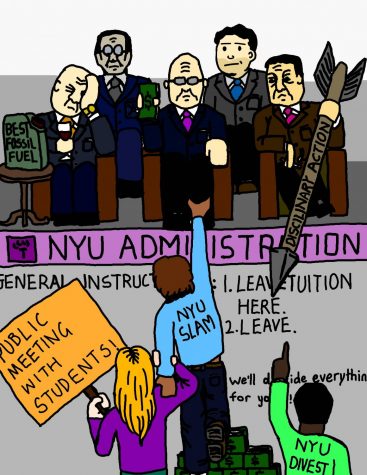Students Are Shouting, Trustees Need to Listen
April 2, 2018
This past week has been a whirlwind for members of the student groups, NYU Student Labor Action Movement and NYU Divest, who have made headlines with their week of activism. Whether it is shouted in the new Bonomi Family Admissions Center or from the steps of the Kimmel Center for University Life, their message is clear — they want student representation on the Board of Trustees, increased communication and full divestment from fossil fuels. We believe that it is imperative that their demands are met — conversations concerning our interests, well-beings and finances should not be hidden from us.
On March 26, Divest and SLAM began their weeklong protests by occupying the new admissions center. After a three-day occupation without a substantial response from either the board or NYU’s administration, the two clubs relocated to Kimmel, where they intended to continue the occupation if they did not receive confirmation of a meeting with administrators by midnight on March 28. Finally, on Thursday, representatives of the two groups met with two NYU administrators, Senior Vice President for University Relations and Public Affairs Lynne Brown and Senior Associate Vice President of Student Affairs Tom Ellett. In the meeting, SLAM and Divest demanded a public town hall meeting with the board, which would then be followed by an annual town hall meeting. The administrators responded that they could not give assurance of a meeting until next Friday, April 6. They also threatened disciplinary action for protestors who stay in NYU facilities past hours of operation. SLAM and Divest will resume their activism on April 9 if they do not receive confirmation of the meeting by this Friday.
It is important for the board to acquiesce to SLAM and Divest’s demands because greater transparency and accountability is essential to ensure the board acts on behalf of the best interests of the NYU community. In the past, members of the board have been linked to investments in the fossil fuel industry and student debt companies. This presents conflicts of interest, seeing that NYU claims to be committed to a more sustainable future. Additionally, when NYU did divest from two direct fossil fuel investments, the student body was not notified, displaying an alarming lack of transparency. In response to the secrecy shrouding the board, student activists have demanded a seat at the table. The University Senate — a body composed of both students and faculty — has recently voted in favor of student representation on the board, so now the only barrier is a board vote. This would enable the student body to be better informed about board decisions and have greater participation in the decision-making process. Furthermore, students could better hold the board accountable in the event that its conflicts of interest affect its decisions.
For now, organizing town hall meetings between the Board of Trustees and representatives of Divest and SLAM appears to be the only effective way to ensure direct communication between the two parties. If the trustees want to fulfill their mission of defending the interests of the NYU community, they can no longer run away from debates with the students at whom their decisions are directed. If the board doesn’t have anything to hide, then it shouldn’t have a problem abandoning its secrecy.
Opinions expressed on the editorial pages are not necessarily those of WSN, and our publication of opinions is not an endorsement of them.
A version of this article appeared in the Monday, April 2 print edition. Email the WSN Editorial Board at [email protected].





























































































































































